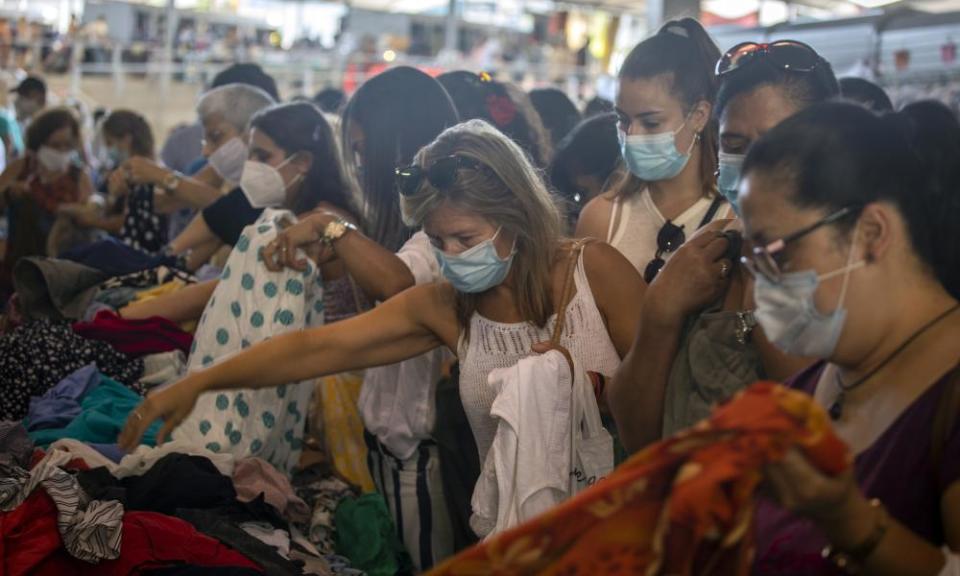Global report: Catalonia makes mask-wearing in public compulsory

Spain’s northern Catalonia region will make wearing a mask in public spaces compulsory at all times from Thursday morning, as French prosecutors charged two men with with attempted murder after a bus driver was attacked and left brain dead for refusing to drive a group of mask-less men.
The move in Catalonia was announced as the region struggles with a renewed outbreak of coronavirus around Lleida that has forced a new lockdown for 200,000 inhabitants and pushed hospitals to the brink.
The announcement by the Catalan regional leader, Quim Torra, came as authorities around the globe confronted fast-emerging new peaks of the disease even as they looked for ways out of economically damaging nationwide lockdowns. “Masks in Catalonia will be mandatory,” said Torra. Spain has since June ordered the use of masks indoors and outside where 1.5 metres of social distancing cannot be maintained.
Explaining the move by the Catalan government to toughen the national directive, spokeswoman Meritxell Budó said: “We understand we should go a little further and enforce mask-wearing regardless of the physical distance between people. It is very important to protect ourselves and others.”
The effectiveness of face coverings in preventing the disease has been a controversial issue around the world, even as scientists and the World Health Organization have debated the mechanism for infection, including the danger of airborne transmission, with fierce resistance to mask-wearing in some places.
default
That issue was underlined by Sunday’s attack in Bayonne in France in which four men attacked 59-year-old bus driver Philippe Monguillot after he asked three of them to wear masks and tried to check another man’s ticket.
Announcing the charges, the assistant prosecutor Marc Mariee denounced an “extremely violent” attack.
“There were insults and then shoving. The bus driver was pushed out of the bus. Two individuals then violently kicked and punched the upper part of his body, including his head,” he told a press conference.
With nearly 11.8m confirmed coronavirus cases worldwide and 543,558 known deaths, the WHO says coronavirus cases are increasing by 200,000 a day, doubling from April and May.
Amid sharp differences in how countries have responded, even within the EU which has seen 100,000 deaths in the 27 nations, German chancellor Angela Merkel, warned that the coronavirus pandemic is showing the limits of fact-denying populism and called on European countries to quickly agree on a major economic recovery package and deprive nationalists of any opportunity to take advantage of the crisis.
Merkel’s remarks to the European Parliament came as the leaders of Italy and Spain the first EU countries to impose far-reaching lockdowns and two of the worst-hit countries in the world urged fellow EU members to agree at a summit next week on ambitious terms for the recovery fund of up to €750bn euros to help get economies back on track.
Underpinning global concern, however, is a picture of resurgences of the virus grimly familiar from Australia to Israel and Uzbekistan, the US and Catalonia as cities, states and even whole countries have been forced to reimpose tough restrictions.
For its part, Italy on Wednesday called for new precautionary measures for passengers travelling to European Union countries from outside the bloc to contain the spread of the new coronavirus.
Italian authorities stopped 125 Bangladeshi people from entering the country on Wednesday after they landed at Rome’s Fiumicino airport on a flight from Qatar.
The move comes as Italy tries to contain an outbreak of coronavirus among the Bangladeshi community in the Lazio region. The passengers will return to Doha on the same flight later today, while those who disembarked were tested for Covid-19 and quarantined for 14 days.
Yesterday, Italy suspended flights from Bangladesh for a week after 36 people who arrived in Rome on board a flight the day before tested positive for coronavirus.
People over 60 or with health issues should wear a medical-grade mask when they are out and cannot socially distance, according to new guidance from the World Health Organization, while all others should wear a three-layer fabric mask.
The WHO guidance, announced on 5 June, is a result of research commissioned by the organisation. It is still unknown whether the wearers of masks are protected, say its experts, but the new design it advocates does give protection to other people if properly used.
The WHO says masks should be made of three layers – with cotton closest to the face, followed by a polypropylene layer and then a synthetic layer that is fluid-resistant. These are no substitute for physical distancing and hand hygiene, it says, but should be worn in situations where distancing is difficult, such as on public transport and at mass demonstrations.
The WHO has been reluctant to commit to recommending face coverings, firstly because the evidence on whether they offer any protection to the public is limited and – more importantly – because it was afraid it would lead to shortages of medical-grade masks for health workers.
Sarah Boseley Health editor
Israel, which initially drew praise for quickly tackling the first stage of its pandemic when it emerged earlier this year, has reintroduced strict stay-home orders following the rise in infections, running at 1,300 new cases in the last 24 hours, that followed the easing of restrictions in May, with some experts blaming schools and weddings for driving the upsurge.
And amid warnings from the world health body’s experts that the pandemic was continuing to escalate, Africa passed the milestone of 500,000 confirmed coronavirus cases.
The total across the continent is at least 504,000 after South Africa recorded another day of more than 10,000 confirmed cases as a new global hot spot.
The true number of cases among Africa’s 1.3 billion people is unknown as its 54 countries continue to face a serious shortage of testing materials for the virus. The WHO’s Africa chief, Matshidiso Moeti, last week called this a tremendous problem, a real crisis of access.

